Google Business Profile and SEO are *not* the same thing
Lumping them together is killing your bottom line.
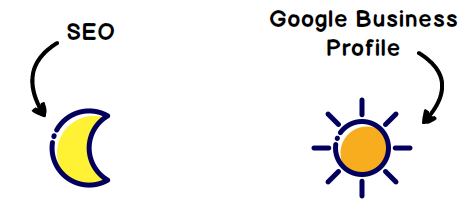
Update: Google My Business is now called "Google Business Profile".
SEO and Google Business Profile are like night and day.
But most business owners think they're the same thing.
This article presents evidence and analysis of why they're so different.
We'll cover:
- The common misconceptions between the two.
- How Google Business Profile and SEO produce different ROIs.
- Why their "success inputs" are completely different.
- How lumping them together is killing your bottom line.
If you're in charge of growing a business - this will help you make informed decisions about where to invest your time and money.
Why do people think they're the same thing?
There's a few reasons why business owners are led to believe SEO and Google Business Profile are the same thing.
I've formatted this section as follows:
❌ First - I'll state the false belief.
✅ Then I'll state what's true.
🔎 And then I'll provide an analysis of why.
Let's get started:
❌ False: "If my website doesn't rank high with SEO - then my Google Business Profile won't either."
✅ True: You can rank high on Google Business Profile without a top ranking website.
🔎 Analysis:
It's a common misconception that your website's SEO performance is linked to the performance of Google Business Profile.
Here's what the data says:
There's a weak correlation (about 17%) between websites ranking on the first page of search results - and top ranking Google Business Profiles.
This was based on two different data sets:
One was by STAT (a search analytics platform) - and another was from my own research.
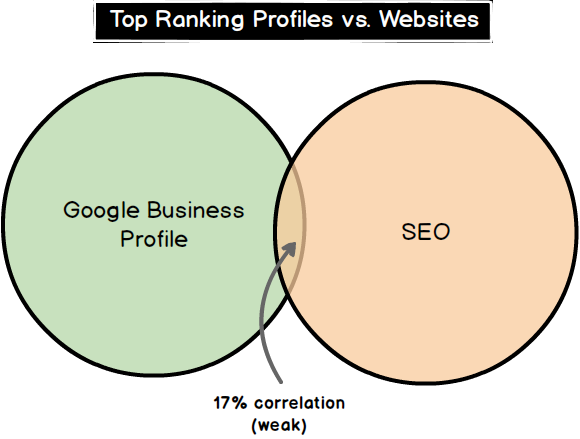
❌ False: "I can't see the difference in Google Analytics, so they must be the same."
✅ True: Google Analytics' default attribution has flaws. You can see the difference with the correct setup.
🔎 Analysis:
If you have Google Analytics, you might know that traffic from Google Business Profile is automatically categorized under the google / organic channel in reporting:

Anyone who sees this can easily think they're the same thing.
But the default setup for Google Analytics is flawed.
Consider this:
Traffic from Facebook Ads and organic social media is also categorized as the same:

You have to manually tag your links to segment the traffic:
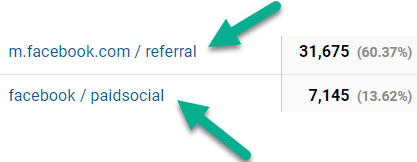
(If you run Facebook Ads - you know the traffic behaves very differently from organic social media. They're not even close to the same thing.)
This is the same case with Google Business Profile.
To segment the traffic, you need to tag your website links:

❌ False: "My SEO agency says Google Business Profile is a part of SEO."
✅ True: Your agency is either being ignorant - or they aren't taking the time to educate you.
🔎 Analysis:
SEO companies making this claim fall into one of two categories:
- They haven't invested time in learning the difference. Probably not a good thing if you're paying them to do the work.
- They know the difference - but don't care if you do. This might be out of laziness -or because they can charge you more - by bundling services for both channels.
Now that we've covered the common misconceptions - let's go over the facts...
The ROI from each channel is very different.
I've run several experiments - in a variety of industries - to test the differences between Google Business Profile and SEO:
- Professional Services: The revenue per lead from Google Business Profile is much greater than SEO.
- Retail + eCommerce: Google Business Profile drives larger average order values and lifetime customer values.
Disclaimer: I'm not saying Google Business Profile will beat SEO in 100% of cases. But I've done enough experiments to see there's a clear trend.
If you want to go deeper - I've published a case study here.
If you don't have time to read that article - I'll leave you with a quick summary:
After comparing thousands of leads generated via SEO and Google Business Profile - it's clear that Google Business Profile generates larger returns.
The results (revenue per lead):
SEO: $153.21
Google Business Profile: $481.07
Leads from Google Business Profile drove 314% more revenue than SEO.
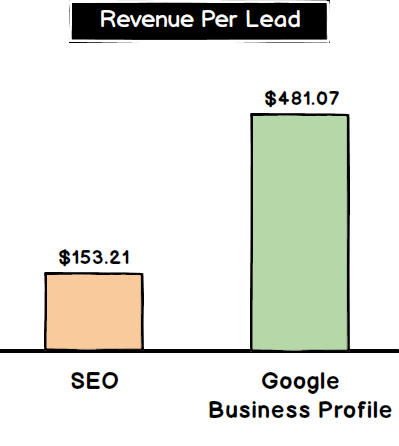
Google Business Profile and SEO require different inputs for success.
Many publications conduct "expert surveys" in the marketing space.
They ask questions like:
"What are the top ranking factors for SEO and Google Business Profile?"
In 2023 - here's what the results look like:
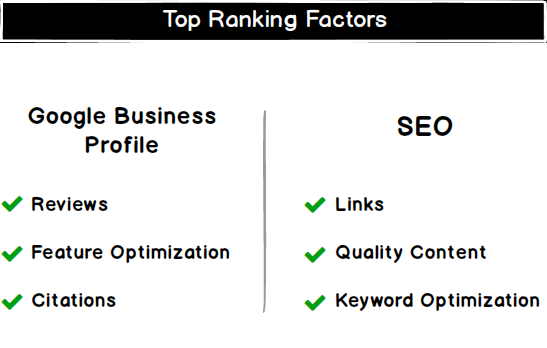
Note: These are considered the top 3 factors for each. But they're far from the only factors.
The takeaways:
- The success of Google Business Profile is dependent on reviews, feature optimization, and citations.
- Success with SEO depends on links, content development, and keyword mapping.
Bottom line: To succeed with either traffic channel - you need to focus on different activities.
By lumping these traffic channels together - most businesses believe they need the same activities to succeed with both.
And it kills their ability to make informed decisions about where to spend their marketing dollars.
Which leads me to the last point...
Lumping them together leads to costly mistakes.
In marketing, the key to making high ROI decisions is segmentation.
Segmenting is the act of separating different types of data from one another.
This allows you to review performance in isolation - which drives meaningful action.
If you're not segmenting Google Business Profile and SEO - here's what you might see when reviewing performance:
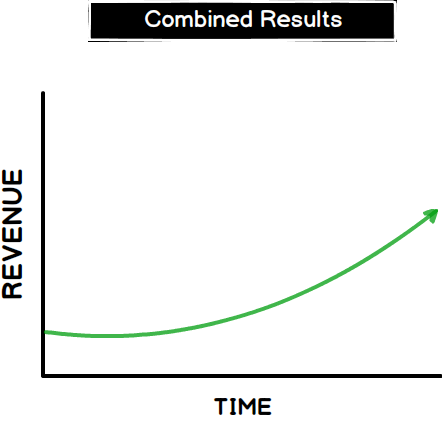
This chart says that revenue from the combination of SEO and Google Business Profile is growing.
But what's causing the revenue growth?
There's no way of knowing.
You're really just staring at a black box...
Because there's no way for you to see what's going on inside.
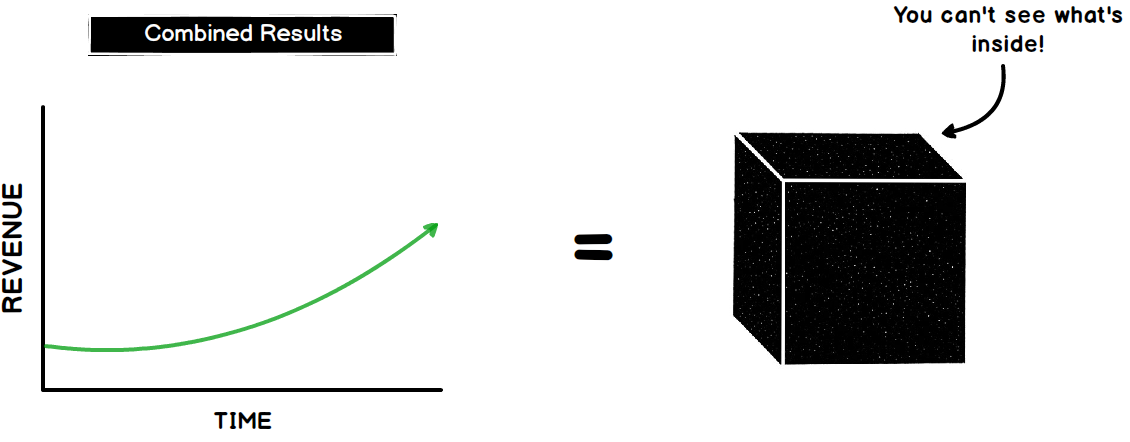
And since you can't see what's working - you might decide to invest in the usual SEO activities:
- Link building
- Content development
- Improving your website architecture
But what if you did segment these channels?
Here's what performance looks like:
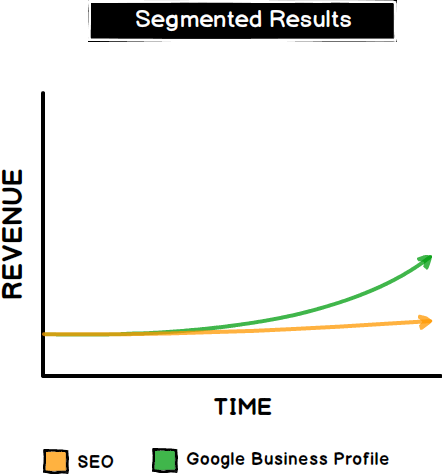
This tells a completely different story...
Google Business Profile is driving the revenue growth - while SEO is static.
This could lead to a totally different set of decisions:
- Maybe you cut back your investment on SEO, since it's barely paying off...
- And then invest a small portion of those savings into Google Business Profile.
Bottom line: You're able to make informed decisions like this, because you can see how each channel is performing in isolation.
Note: These charts are for illustrative purposes. In a future article, I'll do a deep-dive into calculating the ROI of each channel.
What to do next
If you found this helpful - you might be interested in the Execution Plan.
It's a step-by-step guide to building a revenue engine with Google Business Profile.
Click here for the details.